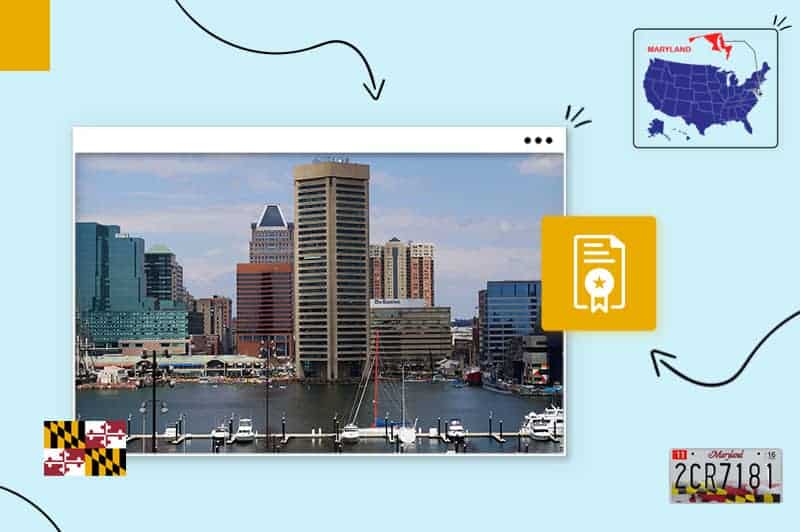In business, location is everything.
And Maryland is an industry hot spot due to its strategic position near New York City, Philadelphia, Baltimore, and Washington, D.C.
But the Old Line State has more than just a great location; it’s also a hotbed of innovation with an educated workforce from various fields, including healthcare, technology, biotechnology, and finance.
Maryland is also the 19th most populous state, with 53% of its inhabitants of prime working age.
CNBC’s Top State For Business Rankings scored Maryland State as:
- 13th best for access to capital.
- 13th best for tech innovation.
- 18th best for quality of life.
- 18th best for education.
Here’s what the Maryland Chamber of Commerce says about starting a business in Maryland:
“Businesses are what drives our economy and what helps communities thrive. We must advocate for and create a more favorable environment that attracts businesses and helps them be successful.”
From choosing a viable idea, licenses, and permits to hiring staff, taxes, and insurance, here’s everything you need to start a business in Maryland.
So it is no wonder that many people looking to start their own business, choose Maryland as their home base.
Here are the steps to follow when starting a business in Maryland:
- Come up with your business idea
- Create a business plan
- Choose your business name
- Choose a business structure
- Register your business in Maryland
- Set up banking, credit cards, & Accounting
- Get funding for your business
- Get insured
- Obtain permits & licenses
- Comply with Maryland tax regulations
- Build your team
Step# 1. Come up with your business idea

Do you have a business idea in mind?
Perhaps you’ve already chosen one; if so, does it align with your interests, enthusiasm, and skill sets?
I ask because running a business is a 24/7 job!
And while your skills matter, your interest will keep you reliable, and your enthusiasm will excite and motivate you day in and day out.
Illustrator and lettering artist Jessica Hische gives this advice about the work we should do:
“The work you do while you procrastinate is probably the work you should do for the rest of your life.”
Don’t rush your decision; take your time when exploring potential business ideas, and when you have one in mind, research and validate it to confirm the profits are worth your investment.
Why you must validate your business idea
Validating your business idea removes any romantic notions of running your new venture and replaces them with cold, hard figures.
Here’s where you crunch the numbers (and put your Shark Tank investor hat on) to determine whether your business idea is financially viable or just a pipe dream.
Begin by calculating your set-up and running costs, both fixed and variable, then estimate when you’ll begin to earn a profit and how much, and put these figures on a monthly balance sheet (excel works excellent for this) to see if your idea is worth your investment of time and money.
Once you’re sure the numbers add up, confirm whether your idea fulfills an unmet need, its likelihood of success based on your community’s interests, and if there’s room for another brand.
And you do those using a business plan.
Step# 2. Create a business plan

Before you invest, test your idea using a business plan that researches your marketplace, target audience, and competitors. Your plan also calculates your financial projections, contains your marketing plan, defines your sales objectives, and outlines the strategies you’ll use to achieve them.
The type of business plan you’ll need (2 exist, traditional and one-page) and the level of detail it’ll contain depends on your chosen marketplace, business structure, and whether you’ll require external funding.
Remember, your business plan is as unique as you are, and there isn`t a one-size-fits-all solution.
However, most business plans have these key sections:
- Market research: Your market research gathers and analyzes the market trends of your chosen business idea, your target audience’s buying habits , and your competitor’s sales strategies to confirm your niche`s popularity and how and where your prospects shop.
Once you have this information, you can create your marketing plan.
- Marketing plan: Your marketing plan outlines when, where, and how you’ll engage and sell to your prospects using specific marketing strategies, like social media, a website, paid advertising, organic SEO, and traditional marketing, usually with time-sensitive objectives.
- Financial projections: Here, you prove your idea is financially viable (essential for getting a loan) by calculating your fixed and variable startup and running costs and future cash flow projections, which you then put onto your business balance sheet.
You can easily create your business plan using our free template and guide.
Choose Your Maryland location
Your location requirements often depend on your business idea.
For instance, many freelancers work from home, and a landscaping service can operate using a commercial lockup. However, aspiring restaurant owners or retail entrepreneurs require a high footfall location with a passing trade and adequate parking.
Whatever your business idea, calculate your location costs, including the rent, utilities, equipment, and insurance, to ensure you can afford the overheads, then add them to your business plan financial section.
But besides the cost, you must choose a location that suits your business type, is convenient for your target audience, where they expect to find it, and complies with local zoning laws!
Maryland zoning laws:
All US states have laws controlling what businesses operate where, including parking requirements, signage, waste disposal, etc.
You must confirm your location has the zoning approval your business needs before you operate by reviewing local ordinances or contacting your town/city zoning or planning department.
Create your online presence
Every business needs an online presence so prospects can review their products/services, read testimonials, book appointments, or buy what you`re selling.
To create a successful online presence, you might need:
- A website: Your business website should showcase your services or products, take orders, arrange delivery, enable appointments, and promote customer testimonials.
- Social media presence: Most brands use 2 or more social platforms (like Instagram, TikTok, Facebook, or YouTube) to connect with and sell to their target audience. To find which social media your prospects use, check out your competitors.
- Supply and distribution plan: Product-selling businesses that buy stock for resale and then deliver need a supply chain and distribution plan.
- Online Tax Laws: Any business that sells to Maryland residents must get a seller’s permit from the Maryland Department of Revenue.
- Maryland-specific regulations regarding online business: All online businesses must comply with state and federal consumer protection laws and adhere to privacy and data security regulations and advertising standards.
Next, come up with a catchy business name:
Step# 3. Choose your business name

A well-chosen business name is essential for conveying your brand’s purpose (what you sell or offer), grabbing your target audience’s attention, and connecting with their emotions.
Your business name should also suit your niche, be available as a domain on your social media platforms, and be free from trademark restrictions.
Once you have a name, ensure it complies with Maryland’s business naming rules:
- Be original: LLC and corporation owners must check their name is distinguishable from other business entities using the Maryland business entity database .
- Include certain words: Separate legal entities like limited liability companies and corporations must include their titles in their business name or an approved abbreviation like “LLC” or “Company” for corporations.
- Exclude specific words: Business names cannot include certain terms (or similar alternatives) like bank, insurance, charity, or doctor unless that’s what they are, or government departments like DIA, FBI, CIA, FDA, or police.
Use a DBA in Maryland:
Any Maryland business can apply to use a Doing Business As (a catchy tradename, which is especially helpful for sole proprietors and general partnerships who use the owner’s names) by filing an Application for Trade Name with the Maryland Department of Assessments and Taxation.
The fee is $25; you must renew it every 5 years.
You’ll also need a business name when forming a business structure; I’ll explain next:
Step# 4. Choose a business structure

Okay, you’ve chosen a business idea and have a catchy name; your next step is deciding which business structure you’ll use to run it under.
Take your time deciding because your chosen structure determines how you register and run your business, pay taxes, hire employees, and more!
The most common types of business structures are:
- Sole proprietorship: An informal structure (you don’t register it with the state) that suits solo entrepreneurs in low-risk professions because, as you are your business, there isn’t any separate liability protection, and your assets are at risk should someone sue you.
- General partnership: Like a sole proprietorship (a non-formal entity with no liability protection) for 2 or more partners working in a low-risk industry.
- Limited liability partnership (LLP): A formal legal entity used by professionals who wish to work together but remain separate for liability purposes.
- Limited liability company (LLC): LLCs ( single or multi-member) are formal legal entities (you register with the Marland Secretary of State office) that provide liability protection.
- S corporations: A legal entity that provides liability protection to its owners (shareholders) who can buy and sell stocks, take a wage, and tax-free dividend payments. The most popular corporation for small businesses is an S corp.
Pro tip:
Many small business owners choose the LLC structure because it’s easy to form, provides liability protection, enables you to hire employees, get a business bank account, and uses the simple pass-through tax structure.
Tax advantages of each option
All the above structures use the pass-through tax structure, which avoids corporate taxes (double taxation) by directing all profits to the owners/shareholders, who report them on their tax returns.
Step#5. Register your business in Maryland
Entrepreneurs who choose a separate business structure like an LLC, LLP, or S corporation must register it with Maryland’s Department of Assessments & Taxation.
The registration steps (and whether you must take them because not all business types do) depend on your structure.
Once you confirm your registration needs, you can use Maryland Business Express.
Okay, let’s see if you must register your business:
- Sole proprietorship: You do not need to register (file organizational documents) a sole proprietorship business in Maryland.
- General partnership: GP owners don`t register their business with Maryland State; however, professionals recommend creating a written partnership agreement to avoid internal disputes.
- Limited liability partnership: You register an LLP with the Maryland Department of Taxation by filing a Certificate of Limited Partnership .
- Limited liability companies: To form an LLC, you must file articles of formation using the Maryland Business Express portal, designate your registered agent, and (although not required) create an operating agreement outlining how owners will run the LLC.
- Corporations: To form a Maryland corp, you must register articles of incorporation with the Maryland Department of Assessments and Taxation, designate your registered agent, and prepare internal bylaws outlining your operating rules.
Step# 6. Set up banking, credit cards, and accounting

Bookkeeping isn’t every small business owner’s favorite pastime, but as your startup’s financial health depends on it, you must master the skill or pay someone else to do it.
Two ways to ease your bookkeeping duties are opening a business bank and credit card account, as they enable you to separate your personal and business finances, simplify tracking your debits and credits (what you earn and spend), and control your cash flow.
Legal entities like LLCs and corporations need business bank accounts to separate their personal and business finances to maintain their liability protection.
While non-legal entities like sole proprietors and general partnerships don’t have this liability issue, business accounts create a business credit history, which can help you get more favorable business loans.
To open a business account in Maryland, you must:
- Register your business with the Maryland Department of Assessments and Taxation .
- Provide your employer identification number (EIN) or social security number (SSN).
- Your business license.
- Provide personal identification and articles of formation/incorporation (if you formed an LLC or corporation).
- And an initial deposit (not all banks require this).
Once your accounts are active, you can track your monthly business income and expenditures and, come tax time, consider passing them over to a Maryland accountant who can ensure you comply with your state and federal tax obligations.
Note:
While sole proprietorships and general partnerships aren’t legal entities, they must register for an SDAT Identification Number using the Maryland Business Express portal to open a business bank account.
Step# 7. Get funding for your business

Financial professionals advise us to have a year’s running costs (in cash) before starting our businesses to cover expenses until we profit.
It’s excellent advice, but not all startups have that cash at hand, and many of us need funding to start our business, let alone run it profit-free for a year!
Fortunately, funding options are available to help us start and run our Maryland businesses:
- Bootstrapping: Entrepreneurs who can’t get financing can use bootstrapping to start their businesses. It involves using their savings and reinvesting their profits until their startup is profitable enough to take a wage.
- Friends and family: Getting funding from friends or family is another option for aspiring business owners who can’t get external funding; just ensure you agree on repayment terms to avoid unwanted disputes.
- Small business loans: SBLs are the traditional way many new business owners fund their initial startup and running costs. Small business loans come from local (and online) banks and include interest rates and fixed repayment times.
- Business line of credit: This funding option suits businesses that experience short-term cash flow problems (like payroll, inventory, and seasonal sales) as you only borrow and pay interest on what you need.
- Crowdfunding: A free way to fund your business where you join a crowdfunding platform, and individuals donate to help you reach your financial target.
Maryland grants and state incentives:
The Old Line State prides itself on assisting entrepreneurs to start and grow their Maryland businesses by offering many tax credits and grants.
Visit the state’s Department of Commerce website to see what`s available for your business.
Maryland Small Business Administration (SBA):
The SBA assists entrepreneurs to start and grow businesses throughout the USA by backing certain financial institutions to provide low-interest-rate, long-term loans.
You can see what’s on offer by visiting the SBA Baltimore district office.
Step# 8. Get insured
Business insurance protects your private assets against personal injury claims, natural catastrophes, theft, and other unforeseen disasters.
Your insurance needs depend on the type of business you start and whether you’ll employ staff.
Consider speaking with an insurance agent about what insurance your business requires, and research combined insurance policies that can reduce your insurance fees.
Common types of business insurance include
- General liability: An insurance policy that covers common risks, including client property damage and injuries (at your workplace). Most Maryland commercial leases require businesses to have general liability insurance.
- Professional liability: For Maryland business professionals like accountants, lawyers, and financial advisors, professional liability insurance (PLI), also known as errors and omissions insurance (E&O), covers lawsuits against work-related performance.
- Business interruption insurance: Covers expenses and lost income if your business stops earning revenue because of illness or natural disaster.
- Commercial property insurance: Covers the cost of your property and contents (including machinery, equipment, furniture, and inventory) in natural disasters, fire, and theft.
- Commercial auto insurance: All Maryland business owners with work vehicles need this policy to cover accident-related property damage, injuries, theft, and vandalism.
- Business owners policy (BOP): A policy that combines 2 or more insurance covers (often general liability and commercial property) into one easy-to-manage insurance policy that’s often cheaper than several separate policies.
- Umbrella insurance: An optional cover that boosts your existing insurance policies should they reach their financial limit.
Maryland state-specific regulations:
Maryland business owners with more than one employee must have workers’ comp insurance to help pay for expenses related to workplace injuries.
Pro tip:
Visit the Maryland Insurance Administration website for further guidance on which insurance policies your new Maryland business requires.
Step# 9. Obtain permits & licenses

When you start a business in Maryland, you’ll need to apply for licenses and permits relative to your niche, business activity, and location.
While Maryland doesn’t have a state-level general business license, your startup may require a state-level occupational license, trader’s license, and local permits.
Use these resources to see which license and permits your business needs:
- Federal: Visit the US Small Business Administration (SBA) guide for federal licenses.
- State: Learn about state requirements using the Maryland OneStop Portal page.
- Local: Some businesses need municipal-level licenses or permits to operate; contact your local county clerk for further information.
Maryland regulatory licenses and permits
To start a business in Maryland and run it legally, you must also comply with state regulatory licenses and permits.
Here’s what you might need:
- Professional and occupational licenses: Certain professions require this license to operate; you’ll find state-issued professional and occupational license requirements at the Division of Occupational and Professional Licensing .
- Seller’s license: Any business that sells taxable goods or services to Maryland state residents must register for a sales and use tax license with the Comptroller of Maryland to collect and pay state sales tax.
- Local permits: Most businesses need local permits; for example, a restaurant or bakery might need health, building, signage permits, etc.
Pro tip:
To learn which state licenses and permits you need, use the Maryland OneStop portal and register using Maryland Business Express. For local licenses and permits, check your location’s official government website.
Step#10. Comply with Maryland tax regulations
When you start a business in Maryland, your first step is registering with the Maryland Department of Assessments and Taxation using the state’s online filing portal.
And if your business needs an employer identification number (EIN), you must first get a Maryland SDAT Identification Number.
Why your business might need an EIN:
- To pay federal taxes.
- Open a Maryland business bank account.
- Hire employees (any business that hires employees needs an EIN).
You can apply for an EIN online from the IRS website.
Maryland local and state taxes
Maryland is great for many things, but taxes aren’t one of them. As a result, Tax Foundation.org ranks it 46th in its 2023 State Business Tax Climate Index. Like many U.S. states, Marland charges a state-graduated individual income tax, corporate tax, sales and use tax (depending on what you sell or provide), and local and city taxes. The good news is that the Old Line State doesn’t charge LLCs franchise tax, but, unfortunately, it charges an additional $300 annual report filing fee! Okay, let’s look at those tax rates next:
- State taxes: Maryland’s income tax rates range from 2.00% to 5.75%, and corporate income tax is 8.25%.
- Local taxes: Local officials set local income taxes, ranging from 2.25% to 3.20%.
- Sales tax: Maryland charges a 6.00% state sales tax rate but does not charge local sales tax.
Pro tax tip: Businesses in specific industries and locations throughout Maryland state can apply for financial incentives, including tax credits from the Maryland Department of Commerce.
Step# 11. Build your team

MJ (Michael Jordon) said before the 6th game in the 1998 NBA finals (which he and the Bulls won for the 6th time) –
“It only takes one match to light a fire.”
While MJ landed the game-winning 2-pointer, he didn’t win 6 NBA titles alone.
He had teammates with various skills (like Steve Kerr, Scottie Pippen, and Dennis Rodman) by his side.
But hiring staff is about more than finding the perfect team; it also means complying with employment regulations.
So, let’s look at Maryland’s next:
Hiring employees’ regulations in Maryland
Maryland employers must comply with state and federal obligations when hiring employees.
For instance:
- Register for employer taxes: Old Line State entrepreneurs planning to hire employees must register with the Comptroller of Maryland.
- Submit your new hire reports: Employers must report new hires to Maryland’s Department of Human Services, Child Support Administration.
- Report your unemployment insurance liability: As per the Maryland unemployment insurance law, you must report your employee’s wages to Maryland’s Division of Unemployment Insurance and pay quarterly unemployment insurance taxes relative to the salaries.
- Withhold taxes: Employers must also withhold Maryland state income tax from their employee’s pay by having them complete Form MW507, “Employee’s Maryland Withholding Exemption Certificate,” when hiring.
Comply with Maryland payroll regulations
All US states have federal payroll laws, but some states further protect employee rights, and Maryland is one of them.
And as an employer, it`s your job to comply with all Marland payroll regulations.
To ensure you do, check out the links below for further information:
- The Maryland Wage Payment and Collection Law determines how often you must pay employees, provides wage deduction guidelines, outlines prohibited employer/employee actions, and informs how employees enforce their rights.
- The Maryland Wage and Hour Law covers minimum wage and overtime regulations.
Like to avoid Maryland employee costs and regulations?
If so, hiring contractors could be the answer!
Hire Maryland contractors
Only some startups can afford full-time employees, but most need people with specific skills to run and grow their businesses.
Here’s where contractors (and online freelancers) can help you achieve your business goals.
For example, you could hire an SEO consultant to improve your website’s organic listing, a social media marketing wizard to create and run your Instagram or Facebook campaigns, or an accountant to assist with payroll and quarterly taxes.
And the best bit is you only hire contractors when needed, saving you the cost of full-time employees!
Conclusion
And that’s how to start a business in Maryland.
We chose the steps in this post because they cover everything you need to start your new business.
But one other thing is essential when becoming an entrepreneur.
I’ll let Jeff Bezos explain:
“All of my best decisions in business and in life have been made with heart, intuition, guts, … not analysis…it turns out in life that your most important decisions are always made with instinct and intuition.”
I guess the takeaway is to trust yourself.
Good luck!
FAQ
Filing an article of organization in person or by mail costs $100; you can expedite the process online for $155. Maryland LLCs must also pay a $300 annual report fee.
Processing times to start a business in Maryland take around 4 weeks.
Maryland doesn’t have a state business license, but most startups need a local license issued by their county clerk’s office.
Business licenses range from $20 to $800, depending on your chosen industry.
Yes, you need a seller’s permit in Maryland if you sell certain taxable goods, services, or properties to Maryland citizens.
You can register a foreign LLC in Maryland by filing with the Maryland State Department of Assessments and Taxation and paying a $100 fee.
You can appoint yourself as a registered agent once you’re over 18 and have a physical Maryland address that’s open during working hours.
